Education: A Tool for Reproducing Inequality or an Engine of Equity?
VerifiedAdded on 2023/06/11
|7
|1558
|458
Essay
AI Summary
This essay critically examines the role of education in society, questioning whether it serves as an 'engine room of equity' or a mechanism for reproducing and reinforcing existing social inequalities. It delves into theoretical understandings of egalitarianism and explores how social inequalities persist despite efforts to promote fairness and equality in education. The essay references Marxist perspectives, highlighting how education can transmit ideologies that favor dominant classes. It also discusses functionalist views, such as those of Talcott Parsons, who see education as a vital mechanism for individual selection and role allocation. The essay concludes by acknowledging that while some social imbalances in education have been mitigated, new forms of discrimination and unfairness have emerged, hindering the equitable distribution of educational opportunities and privileges. It emphasizes that although egalitarian ideals have encouraged social and educational development, social inequalities continue to impede the progressive development of education.
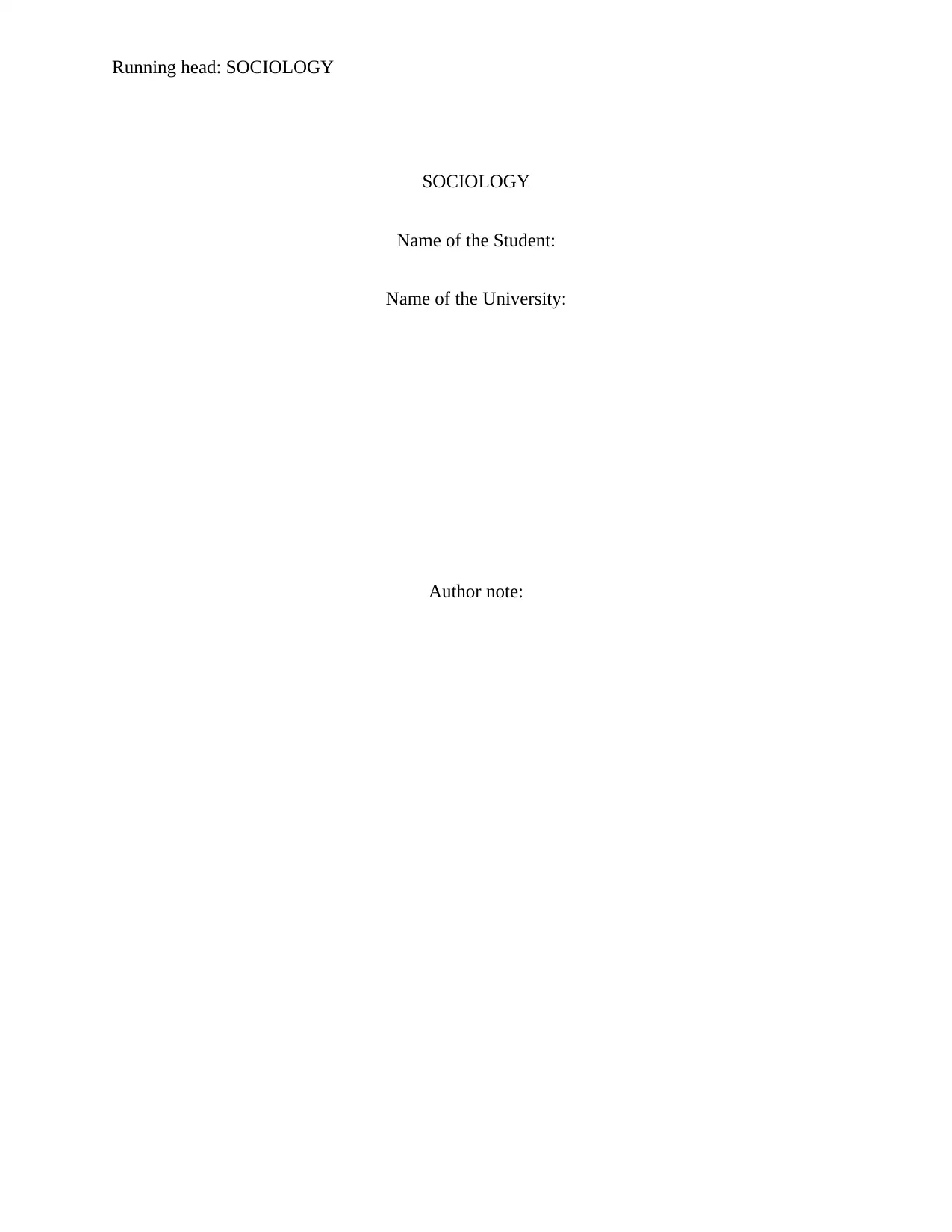
Running head: SOCIOLOGY
SOCIOLOGY
Name of the Student:
Name of the University:
Author note:
SOCIOLOGY
Name of the Student:
Name of the University:
Author note:
Paraphrase This Document
Need a fresh take? Get an instant paraphrase of this document with our AI Paraphraser
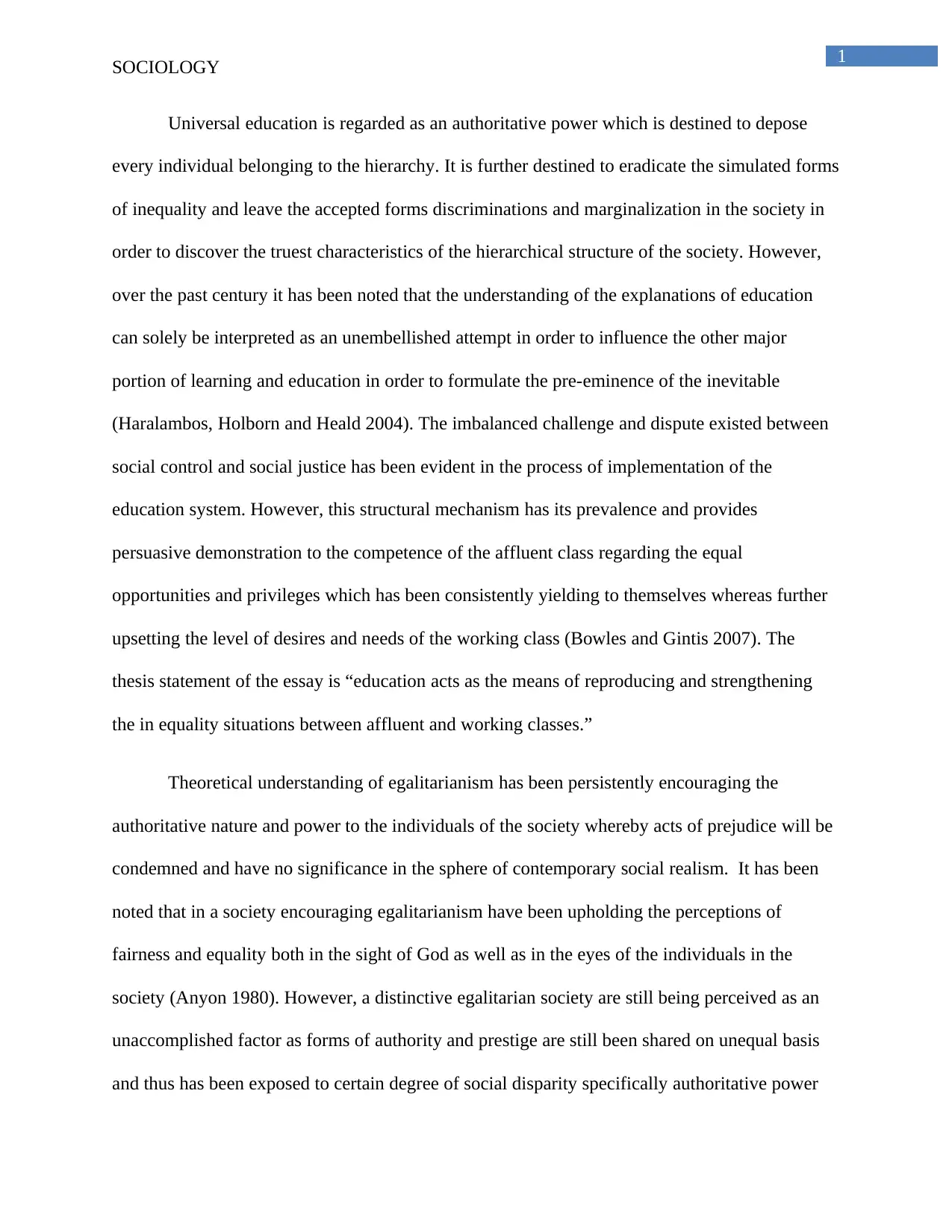
1
SOCIOLOGY
Universal education is regarded as an authoritative power which is destined to depose
every individual belonging to the hierarchy. It is further destined to eradicate the simulated forms
of inequality and leave the accepted forms discriminations and marginalization in the society in
order to discover the truest characteristics of the hierarchical structure of the society. However,
over the past century it has been noted that the understanding of the explanations of education
can solely be interpreted as an unembellished attempt in order to influence the other major
portion of learning and education in order to formulate the pre-eminence of the inevitable
(Haralambos, Holborn and Heald 2004). The imbalanced challenge and dispute existed between
social control and social justice has been evident in the process of implementation of the
education system. However, this structural mechanism has its prevalence and provides
persuasive demonstration to the competence of the affluent class regarding the equal
opportunities and privileges which has been consistently yielding to themselves whereas further
upsetting the level of desires and needs of the working class (Bowles and Gintis 2007). The
thesis statement of the essay is “education acts as the means of reproducing and strengthening
the in equality situations between affluent and working classes.”
Theoretical understanding of egalitarianism has been persistently encouraging the
authoritative nature and power to the individuals of the society whereby acts of prejudice will be
condemned and have no significance in the sphere of contemporary social realism. It has been
noted that in a society encouraging egalitarianism have been upholding the perceptions of
fairness and equality both in the sight of God as well as in the eyes of the individuals in the
society (Anyon 1980). However, a distinctive egalitarian society are still being perceived as an
unaccomplished factor as forms of authority and prestige are still been shared on unequal basis
and thus has been exposed to certain degree of social disparity specifically authoritative power
SOCIOLOGY
Universal education is regarded as an authoritative power which is destined to depose
every individual belonging to the hierarchy. It is further destined to eradicate the simulated forms
of inequality and leave the accepted forms discriminations and marginalization in the society in
order to discover the truest characteristics of the hierarchical structure of the society. However,
over the past century it has been noted that the understanding of the explanations of education
can solely be interpreted as an unembellished attempt in order to influence the other major
portion of learning and education in order to formulate the pre-eminence of the inevitable
(Haralambos, Holborn and Heald 2004). The imbalanced challenge and dispute existed between
social control and social justice has been evident in the process of implementation of the
education system. However, this structural mechanism has its prevalence and provides
persuasive demonstration to the competence of the affluent class regarding the equal
opportunities and privileges which has been consistently yielding to themselves whereas further
upsetting the level of desires and needs of the working class (Bowles and Gintis 2007). The
thesis statement of the essay is “education acts as the means of reproducing and strengthening
the in equality situations between affluent and working classes.”
Theoretical understanding of egalitarianism has been persistently encouraging the
authoritative nature and power to the individuals of the society whereby acts of prejudice will be
condemned and have no significance in the sphere of contemporary social realism. It has been
noted that in a society encouraging egalitarianism have been upholding the perceptions of
fairness and equality both in the sight of God as well as in the eyes of the individuals in the
society (Anyon 1980). However, a distinctive egalitarian society are still being perceived as an
unaccomplished factor as forms of authority and prestige are still been shared on unequal basis
and thus has been exposed to certain degree of social disparity specifically authoritative power
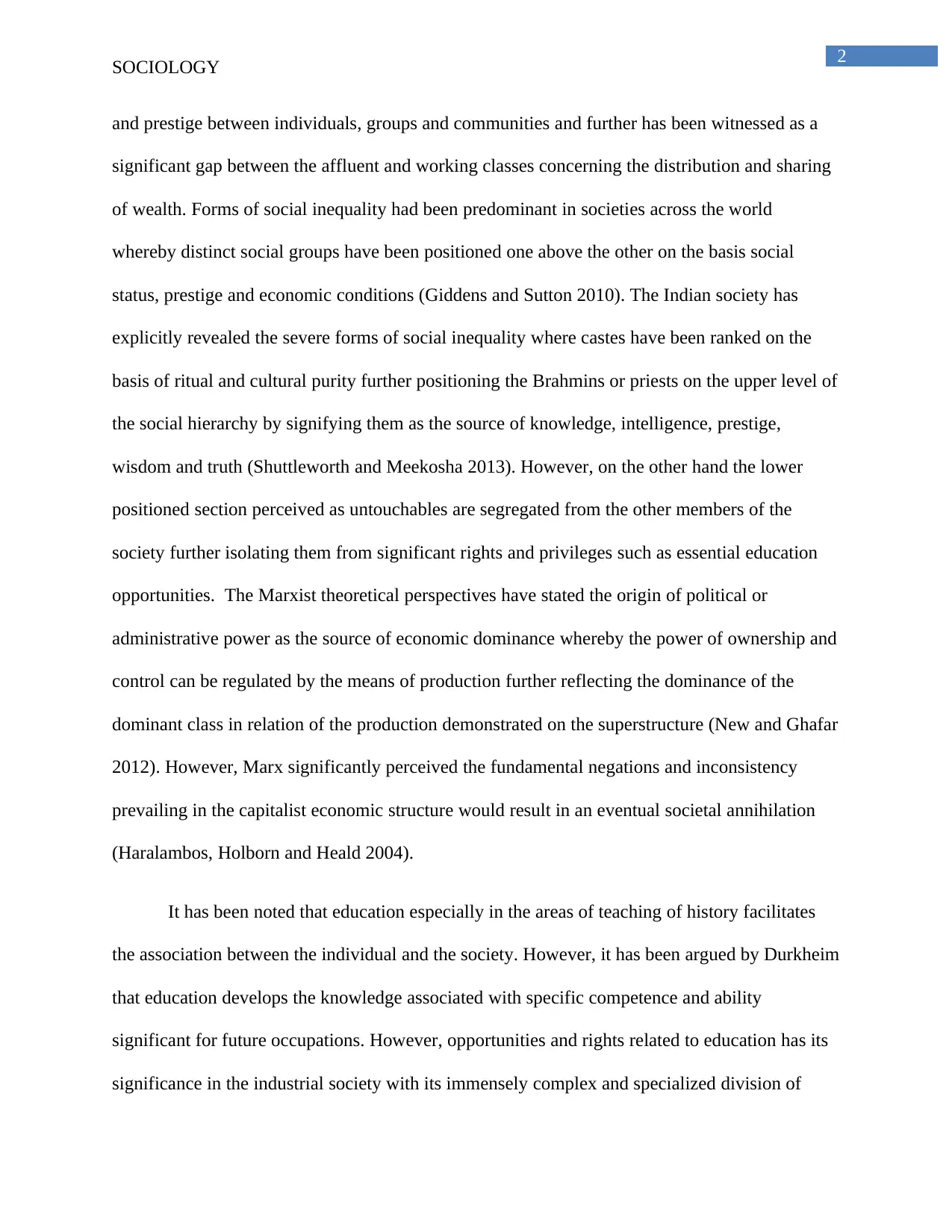
2
SOCIOLOGY
and prestige between individuals, groups and communities and further has been witnessed as a
significant gap between the affluent and working classes concerning the distribution and sharing
of wealth. Forms of social inequality had been predominant in societies across the world
whereby distinct social groups have been positioned one above the other on the basis social
status, prestige and economic conditions (Giddens and Sutton 2010). The Indian society has
explicitly revealed the severe forms of social inequality where castes have been ranked on the
basis of ritual and cultural purity further positioning the Brahmins or priests on the upper level of
the social hierarchy by signifying them as the source of knowledge, intelligence, prestige,
wisdom and truth (Shuttleworth and Meekosha 2013). However, on the other hand the lower
positioned section perceived as untouchables are segregated from the other members of the
society further isolating them from significant rights and privileges such as essential education
opportunities. The Marxist theoretical perspectives have stated the origin of political or
administrative power as the source of economic dominance whereby the power of ownership and
control can be regulated by the means of production further reflecting the dominance of the
dominant class in relation of the production demonstrated on the superstructure (New and Ghafar
2012). However, Marx significantly perceived the fundamental negations and inconsistency
prevailing in the capitalist economic structure would result in an eventual societal annihilation
(Haralambos, Holborn and Heald 2004).
It has been noted that education especially in the areas of teaching of history facilitates
the association between the individual and the society. However, it has been argued by Durkheim
that education develops the knowledge associated with specific competence and ability
significant for future occupations. However, opportunities and rights related to education has its
significance in the industrial society with its immensely complex and specialized division of
SOCIOLOGY
and prestige between individuals, groups and communities and further has been witnessed as a
significant gap between the affluent and working classes concerning the distribution and sharing
of wealth. Forms of social inequality had been predominant in societies across the world
whereby distinct social groups have been positioned one above the other on the basis social
status, prestige and economic conditions (Giddens and Sutton 2010). The Indian society has
explicitly revealed the severe forms of social inequality where castes have been ranked on the
basis of ritual and cultural purity further positioning the Brahmins or priests on the upper level of
the social hierarchy by signifying them as the source of knowledge, intelligence, prestige,
wisdom and truth (Shuttleworth and Meekosha 2013). However, on the other hand the lower
positioned section perceived as untouchables are segregated from the other members of the
society further isolating them from significant rights and privileges such as essential education
opportunities. The Marxist theoretical perspectives have stated the origin of political or
administrative power as the source of economic dominance whereby the power of ownership and
control can be regulated by the means of production further reflecting the dominance of the
dominant class in relation of the production demonstrated on the superstructure (New and Ghafar
2012). However, Marx significantly perceived the fundamental negations and inconsistency
prevailing in the capitalist economic structure would result in an eventual societal annihilation
(Haralambos, Holborn and Heald 2004).
It has been noted that education especially in the areas of teaching of history facilitates
the association between the individual and the society. However, it has been argued by Durkheim
that education develops the knowledge associated with specific competence and ability
significant for future occupations. However, opportunities and rights related to education has its
significance in the industrial society with its immensely complex and specialized division of
⊘ This is a preview!⊘
Do you want full access?
Subscribe today to unlock all pages.

Trusted by 1+ million students worldwide
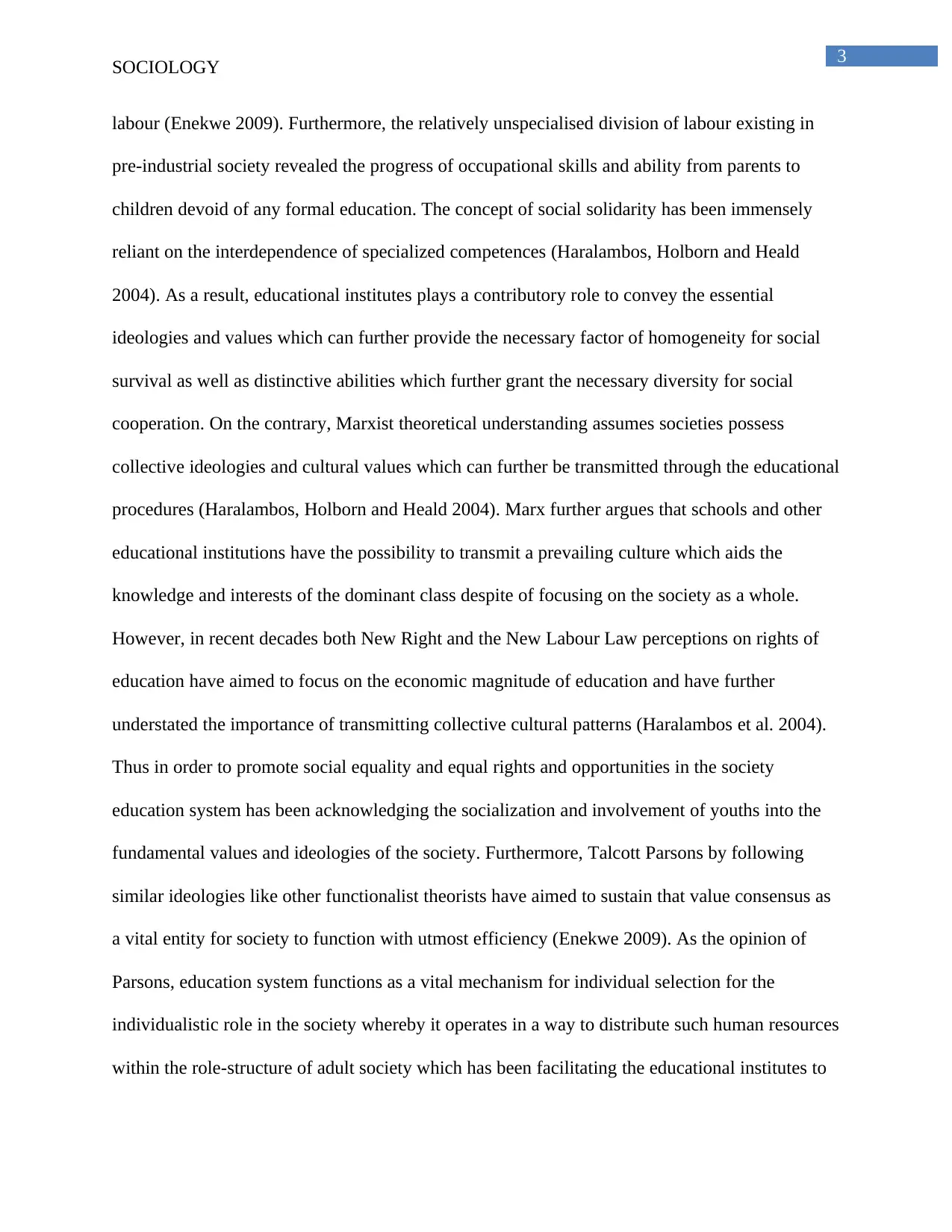
3
SOCIOLOGY
labour (Enekwe 2009). Furthermore, the relatively unspecialised division of labour existing in
pre-industrial society revealed the progress of occupational skills and ability from parents to
children devoid of any formal education. The concept of social solidarity has been immensely
reliant on the interdependence of specialized competences (Haralambos, Holborn and Heald
2004). As a result, educational institutes plays a contributory role to convey the essential
ideologies and values which can further provide the necessary factor of homogeneity for social
survival as well as distinctive abilities which further grant the necessary diversity for social
cooperation. On the contrary, Marxist theoretical understanding assumes societies possess
collective ideologies and cultural values which can further be transmitted through the educational
procedures (Haralambos, Holborn and Heald 2004). Marx further argues that schools and other
educational institutions have the possibility to transmit a prevailing culture which aids the
knowledge and interests of the dominant class despite of focusing on the society as a whole.
However, in recent decades both New Right and the New Labour Law perceptions on rights of
education have aimed to focus on the economic magnitude of education and have further
understated the importance of transmitting collective cultural patterns (Haralambos et al. 2004).
Thus in order to promote social equality and equal rights and opportunities in the society
education system has been acknowledging the socialization and involvement of youths into the
fundamental values and ideologies of the society. Furthermore, Talcott Parsons by following
similar ideologies like other functionalist theorists have aimed to sustain that value consensus as
a vital entity for society to function with utmost efficiency (Enekwe 2009). As the opinion of
Parsons, education system functions as a vital mechanism for individual selection for the
individualistic role in the society whereby it operates in a way to distribute such human resources
within the role-structure of adult society which has been facilitating the educational institutes to
SOCIOLOGY
labour (Enekwe 2009). Furthermore, the relatively unspecialised division of labour existing in
pre-industrial society revealed the progress of occupational skills and ability from parents to
children devoid of any formal education. The concept of social solidarity has been immensely
reliant on the interdependence of specialized competences (Haralambos, Holborn and Heald
2004). As a result, educational institutes plays a contributory role to convey the essential
ideologies and values which can further provide the necessary factor of homogeneity for social
survival as well as distinctive abilities which further grant the necessary diversity for social
cooperation. On the contrary, Marxist theoretical understanding assumes societies possess
collective ideologies and cultural values which can further be transmitted through the educational
procedures (Haralambos, Holborn and Heald 2004). Marx further argues that schools and other
educational institutions have the possibility to transmit a prevailing culture which aids the
knowledge and interests of the dominant class despite of focusing on the society as a whole.
However, in recent decades both New Right and the New Labour Law perceptions on rights of
education have aimed to focus on the economic magnitude of education and have further
understated the importance of transmitting collective cultural patterns (Haralambos et al. 2004).
Thus in order to promote social equality and equal rights and opportunities in the society
education system has been acknowledging the socialization and involvement of youths into the
fundamental values and ideologies of the society. Furthermore, Talcott Parsons by following
similar ideologies like other functionalist theorists have aimed to sustain that value consensus as
a vital entity for society to function with utmost efficiency (Enekwe 2009). As the opinion of
Parsons, education system functions as a vital mechanism for individual selection for the
individualistic role in the society whereby it operates in a way to distribute such human resources
within the role-structure of adult society which has been facilitating the educational institutes to
Paraphrase This Document
Need a fresh take? Get an instant paraphrase of this document with our AI Paraphraser
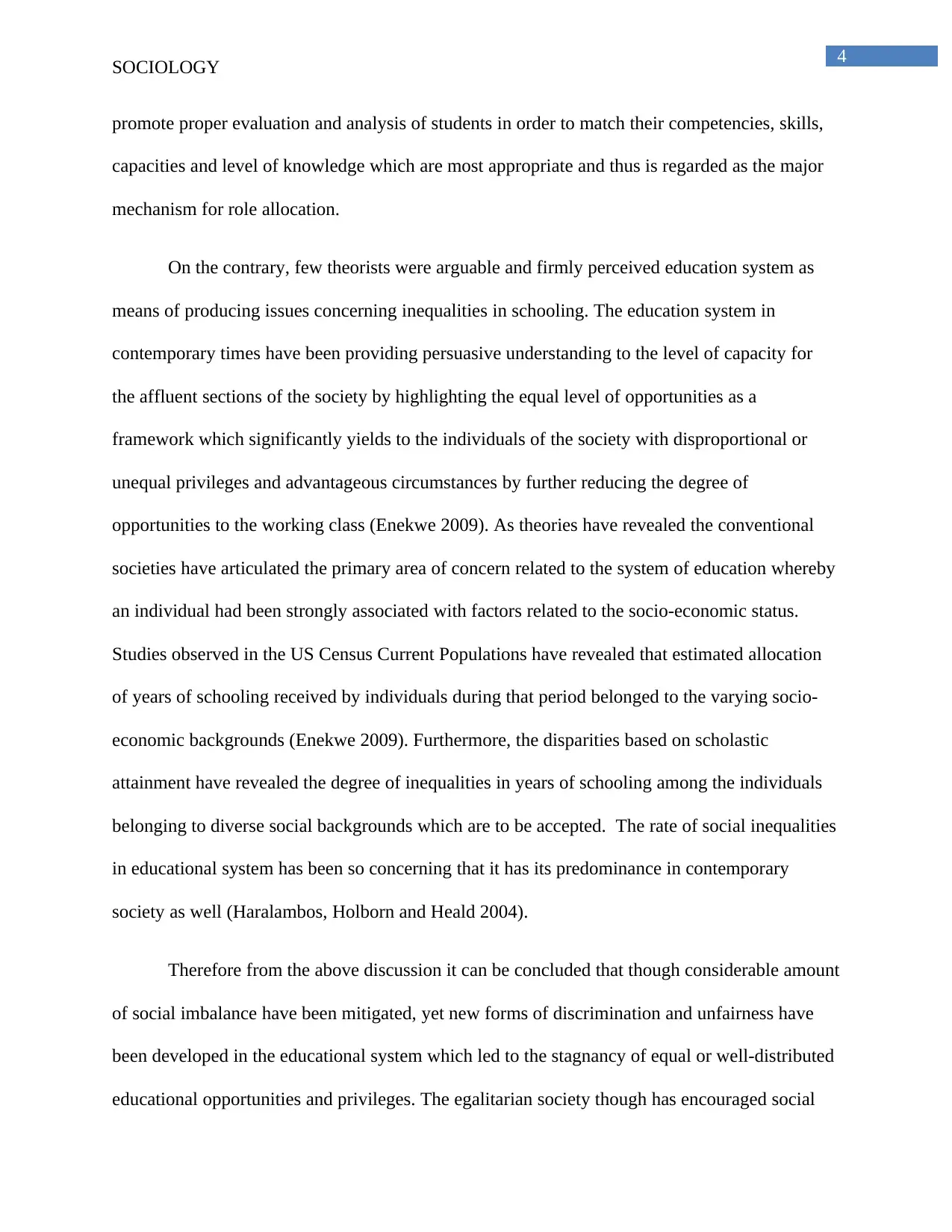
4
SOCIOLOGY
promote proper evaluation and analysis of students in order to match their competencies, skills,
capacities and level of knowledge which are most appropriate and thus is regarded as the major
mechanism for role allocation.
On the contrary, few theorists were arguable and firmly perceived education system as
means of producing issues concerning inequalities in schooling. The education system in
contemporary times have been providing persuasive understanding to the level of capacity for
the affluent sections of the society by highlighting the equal level of opportunities as a
framework which significantly yields to the individuals of the society with disproportional or
unequal privileges and advantageous circumstances by further reducing the degree of
opportunities to the working class (Enekwe 2009). As theories have revealed the conventional
societies have articulated the primary area of concern related to the system of education whereby
an individual had been strongly associated with factors related to the socio-economic status.
Studies observed in the US Census Current Populations have revealed that estimated allocation
of years of schooling received by individuals during that period belonged to the varying socio-
economic backgrounds (Enekwe 2009). Furthermore, the disparities based on scholastic
attainment have revealed the degree of inequalities in years of schooling among the individuals
belonging to diverse social backgrounds which are to be accepted. The rate of social inequalities
in educational system has been so concerning that it has its predominance in contemporary
society as well (Haralambos, Holborn and Heald 2004).
Therefore from the above discussion it can be concluded that though considerable amount
of social imbalance have been mitigated, yet new forms of discrimination and unfairness have
been developed in the educational system which led to the stagnancy of equal or well-distributed
educational opportunities and privileges. The egalitarian society though has encouraged social
SOCIOLOGY
promote proper evaluation and analysis of students in order to match their competencies, skills,
capacities and level of knowledge which are most appropriate and thus is regarded as the major
mechanism for role allocation.
On the contrary, few theorists were arguable and firmly perceived education system as
means of producing issues concerning inequalities in schooling. The education system in
contemporary times have been providing persuasive understanding to the level of capacity for
the affluent sections of the society by highlighting the equal level of opportunities as a
framework which significantly yields to the individuals of the society with disproportional or
unequal privileges and advantageous circumstances by further reducing the degree of
opportunities to the working class (Enekwe 2009). As theories have revealed the conventional
societies have articulated the primary area of concern related to the system of education whereby
an individual had been strongly associated with factors related to the socio-economic status.
Studies observed in the US Census Current Populations have revealed that estimated allocation
of years of schooling received by individuals during that period belonged to the varying socio-
economic backgrounds (Enekwe 2009). Furthermore, the disparities based on scholastic
attainment have revealed the degree of inequalities in years of schooling among the individuals
belonging to diverse social backgrounds which are to be accepted. The rate of social inequalities
in educational system has been so concerning that it has its predominance in contemporary
society as well (Haralambos, Holborn and Heald 2004).
Therefore from the above discussion it can be concluded that though considerable amount
of social imbalance have been mitigated, yet new forms of discrimination and unfairness have
been developed in the educational system which led to the stagnancy of equal or well-distributed
educational opportunities and privileges. The egalitarian society though has encouraged social
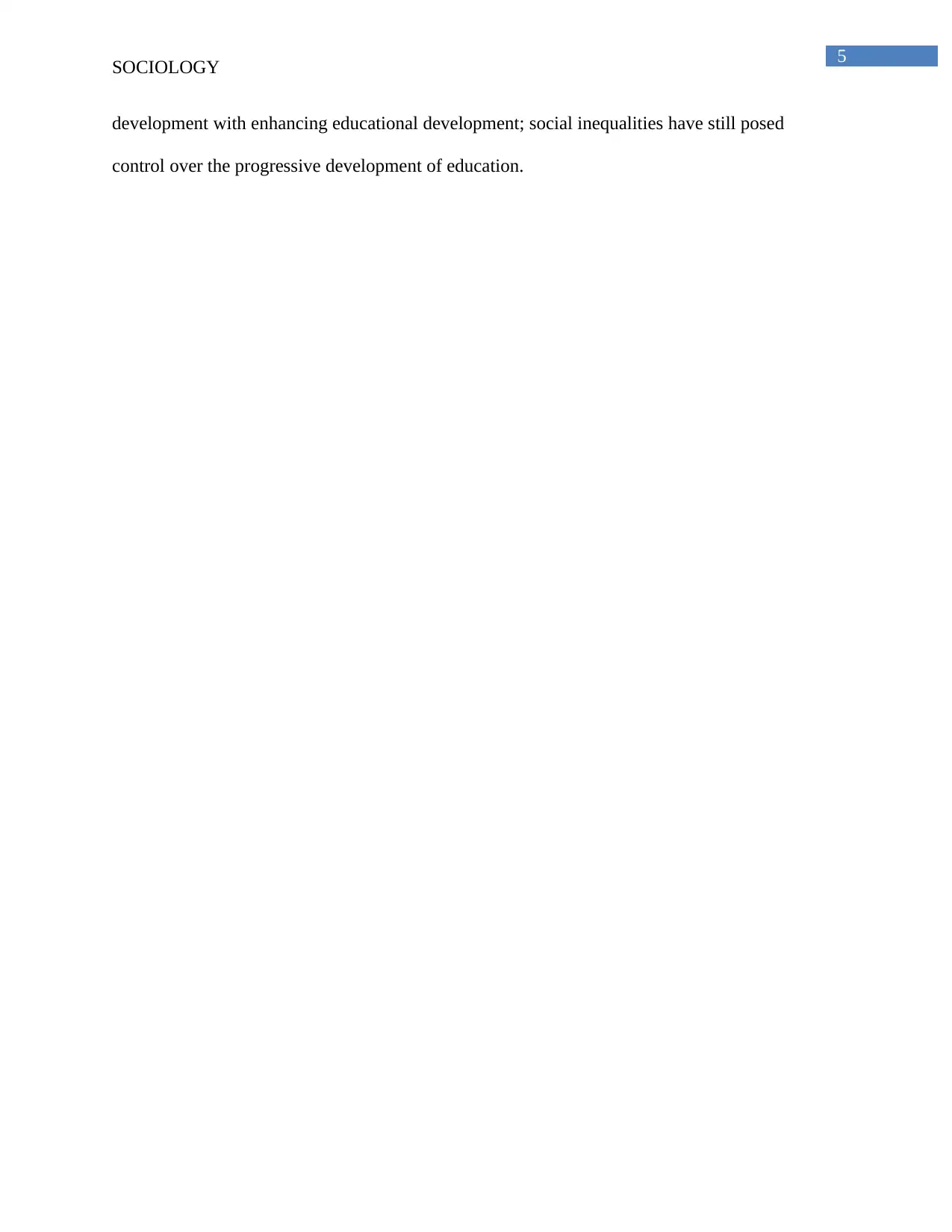
5
SOCIOLOGY
development with enhancing educational development; social inequalities have still posed
control over the progressive development of education.
SOCIOLOGY
development with enhancing educational development; social inequalities have still posed
control over the progressive development of education.
⊘ This is a preview!⊘
Do you want full access?
Subscribe today to unlock all pages.

Trusted by 1+ million students worldwide
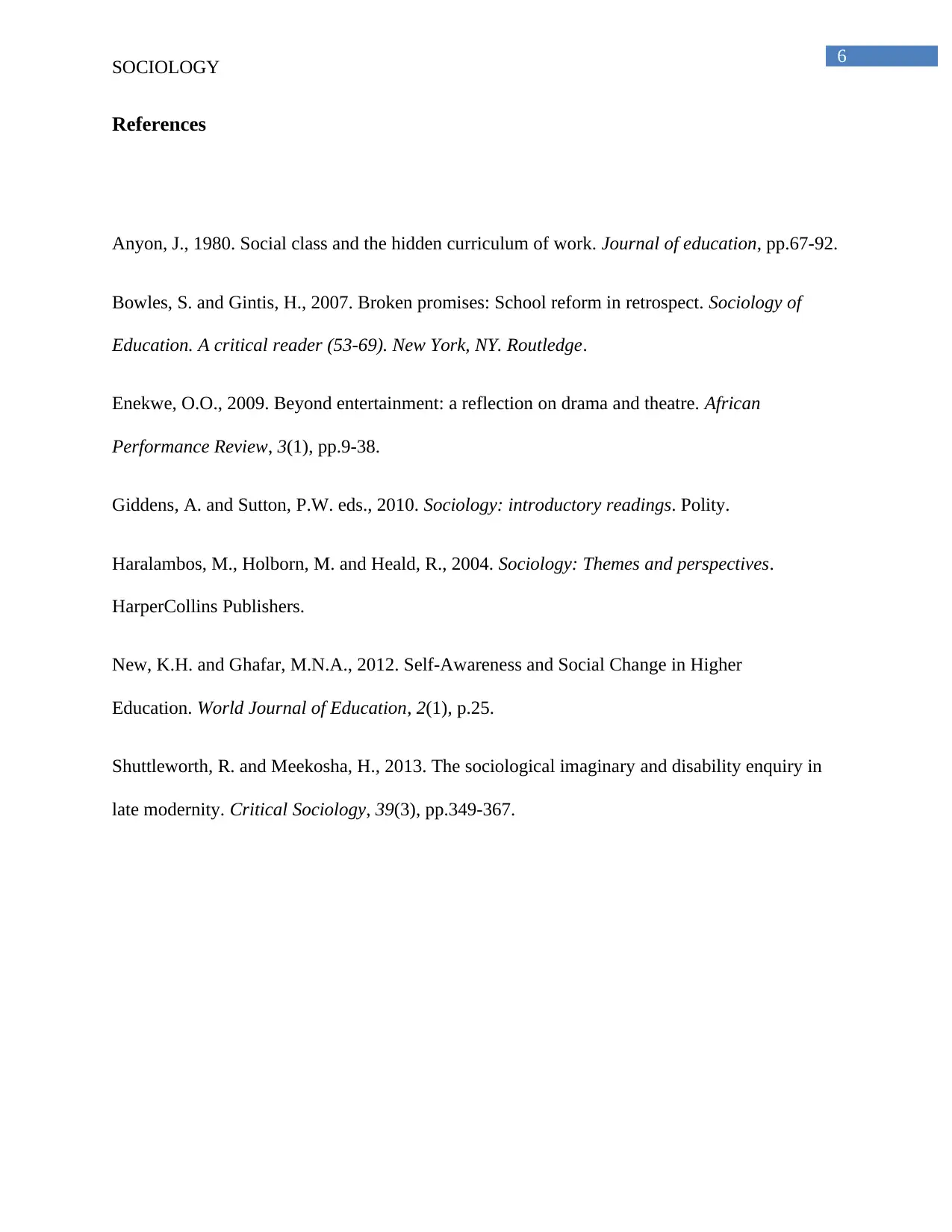
6
SOCIOLOGY
References
Anyon, J., 1980. Social class and the hidden curriculum of work. Journal of education, pp.67-92.
Bowles, S. and Gintis, H., 2007. Broken promises: School reform in retrospect. Sociology of
Education. A critical reader (53-69). New York, NY. Routledge.
Enekwe, O.O., 2009. Beyond entertainment: a reflection on drama and theatre. African
Performance Review, 3(1), pp.9-38.
Giddens, A. and Sutton, P.W. eds., 2010. Sociology: introductory readings. Polity.
Haralambos, M., Holborn, M. and Heald, R., 2004. Sociology: Themes and perspectives.
HarperCollins Publishers.
New, K.H. and Ghafar, M.N.A., 2012. Self-Awareness and Social Change in Higher
Education. World Journal of Education, 2(1), p.25.
Shuttleworth, R. and Meekosha, H., 2013. The sociological imaginary and disability enquiry in
late modernity. Critical Sociology, 39(3), pp.349-367.
SOCIOLOGY
References
Anyon, J., 1980. Social class and the hidden curriculum of work. Journal of education, pp.67-92.
Bowles, S. and Gintis, H., 2007. Broken promises: School reform in retrospect. Sociology of
Education. A critical reader (53-69). New York, NY. Routledge.
Enekwe, O.O., 2009. Beyond entertainment: a reflection on drama and theatre. African
Performance Review, 3(1), pp.9-38.
Giddens, A. and Sutton, P.W. eds., 2010. Sociology: introductory readings. Polity.
Haralambos, M., Holborn, M. and Heald, R., 2004. Sociology: Themes and perspectives.
HarperCollins Publishers.
New, K.H. and Ghafar, M.N.A., 2012. Self-Awareness and Social Change in Higher
Education. World Journal of Education, 2(1), p.25.
Shuttleworth, R. and Meekosha, H., 2013. The sociological imaginary and disability enquiry in
late modernity. Critical Sociology, 39(3), pp.349-367.
1 out of 7
Related Documents
Your All-in-One AI-Powered Toolkit for Academic Success.
+13062052269
info@desklib.com
Available 24*7 on WhatsApp / Email
![[object Object]](/_next/static/media/star-bottom.7253800d.svg)
Unlock your academic potential
Copyright © 2020–2025 A2Z Services. All Rights Reserved. Developed and managed by ZUCOL.





